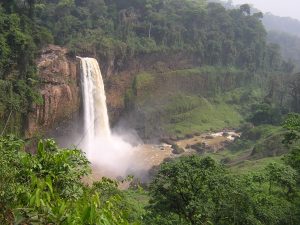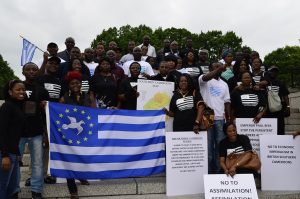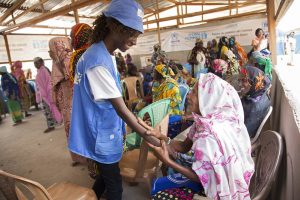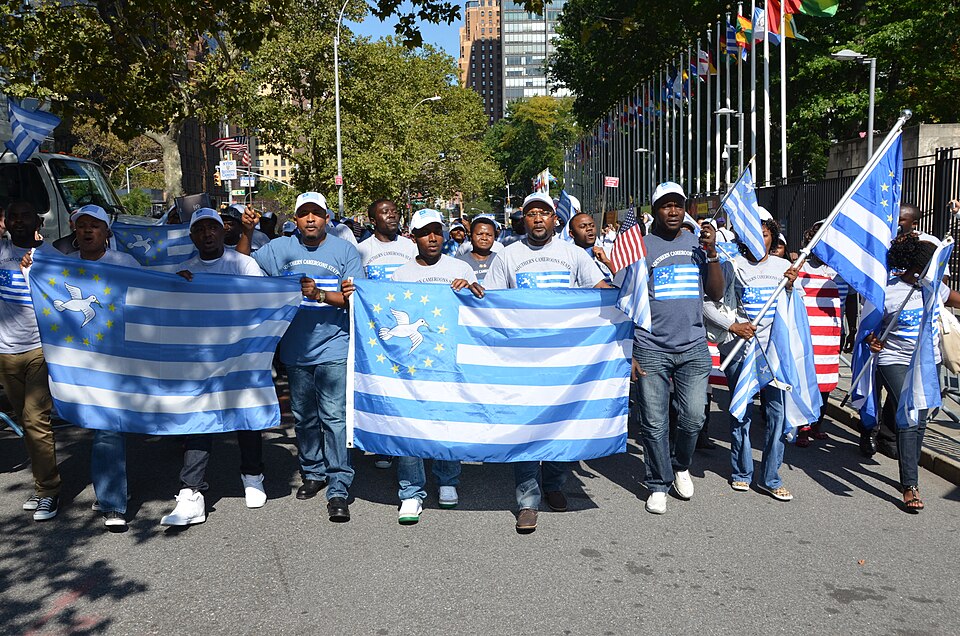
| Courtesy of Wikimedia Commons
Cameroon is known as “Africa in Miniature” on account of its diverse landscapes that mimic the diversity of the African continent. Cameroon is home to pristine beaches, vast deserts, staggering mountains, lush rainforests, and sun-drenched savannas.1 This sweeping range of ecosystems allows wildlife to flourish. Conservation groups like the African Wildlife Foundation and Wildlife Conservation Society have focused major conservation efforts in Cameroon due to its biodiversity. Beyond nature, Cameroon has thriving, diverse cultures. The country encompasses over 200 different ethnic groups with over 200 different languages.2 Cameroon has one of the most diverse culinary profiles on the continent which provides for rich cultural experiences in daily life as well.
Beautiful landscapes and diverse cultures may be characteristic of Cameroon, but for many citizens, the country’s natural beauty hides a much harsher reality. For some, living in Cameroon means being relegated to a life of second-class citizenship, facing political violence and even death.3 The situation has become so dire that many Cameroonians are fleeing their country as asylum seekers – sometimes traveling for months and through some of the most dangerous places on the planet, like the Darian Gap, to receive asylum status in countries like the United States.4
Ngwa Augustine experienced this persecution. A Cameroonian refugee, Augustine received asylum in the US after fleeing his home.5 Augustine explained that he felt like a second-class citizen in his own country due to the oppression of Anglophone culture, so he protested against the government to restore his rights. However, the protests did not achieve the resolution Augustine and other Anglophones hoped for. Instead, the protests turned violent, with many protesters facing arrest, torture, and even death.6 This violence continued growing into the Anglophone Crisis. This crisis has been ongoing since 2016, with growing patterns of human rights violations that have increased in severity. Many Cameroonians, like Augustine, have risked their life fleeing the country because they have no other choice.7
Historically Diverging Linguistic Paths
The Anglophone Crisis is rooted in tensions that date back to colonial times. Prior to colonization, Cameroon was not a unified region – it was home to many different kingdoms and villages.8 The region first became a unit in the 1800s under Germany, when the colony of Kamerun was established. British and French forces divided this territory and claimed it as their own after defeating German forces in World War I. These territorial demarcations helped form the distinct identities in the two regions, identities that have continued to play a role in the instability Cameroon faces today. These British and French territories eventually united in the 1960s, but the process deprived the British territory (now West Cameroon) of the right to self-determination.
In the 1950s, the UN began the decolonisation project, which guaranteed the termination of colonial rule.9 As a result, French Cameroon gained its independence in 1960 and became the Republic of Cameroon. Independence for British Cameroon was planned for 1961 but was never fully implemented. Instead, the UN offered British Cameroon two options: to gain independence by joining Nigeria or to gain independence by joining the Republic of Cameroon.10 British Cameroon voted to join the Republic of Cameroon under the framework of a federation. However, these choices denied British Cameroon the opportunity for a fully free choice and the right to self-determination; other actors saw this issue as well. The Republic of Cameroon initially voted against the federation with British Cameroon because it was a “perpetuation of illegality.” Brazil voted against the resolution, stating it was illegal. A Chinese representative also noted that this deprived the people of British Cameroon of full independence, and a representative from Madagascar took issue with the power imbalance between the Republic of Cameroon and British Cameroon. However, the UN and supporting states ignored these concerns, and British Cameroon was joined with the Republic of Cameroon to create a unitary state in 1962 named the United Republic of Cameroon.11
British Cameroon became West Cameroon and was supposed to retain its governmental structures within the federalist system outlined in Cameroon’s constitution. The constitution stated that the federal nature of the country could not be changed for any reason.12 It also protected bilingualism and sought to preserve both the English and French-speaking cultures.13 However, in 1972, President Ahmadou Ahidjo held a referendum and, based on the outcome, transformed the United Republic of Cameroon into a unitary state and dissolved the federalist institutions.14 This transition toward a centralized state continued under the President of Paul Biya, who changed the country’s name back to the Republic of Cameroon, as it was before West Cameroon was added. Since then, the government of Cameroon has denied the separate existence of West Cameroon and replaced the institutions and cultures in West Cameroon with French systems. The educational and Judicial systems follow French systems; most laws and the President’s speeches are only published in French, and even the French version of the Constitution is considered to be more authentic.15 These divisions persist and contribute to the security crises that Cameroon faces today.
Cameroon’s Security Challenges – The Anglophone Crisis
Cameroon is facing several long-term crises throughout the country.16 In the Far North region, conflict is prominent due to the jihadist group Boko Haram, which conducts cross-border raids and attacks in Niger, Chad, and Cameroon. Violence in this region has displaced an estimated 500,000 people. Cameroon’s eastern region is also facing a crisis caused by an influx of refugees from the neighboring Central African Republic. This crisis has led to more than 350,000 Central African Republic refugees fleeing to Cameroon.
However, the most destabilizing and complex challenge to security in Cameroon is the Anglophone Crisis in the Northwest and Southwest regions, which has displaced more than half a million people. Unlike the other security threats Cameroon faces, this crisis is rooted in issues from colonialism and implicates international law because of the conflict’s humanitarian impact and oppressive nature. This conflict has developed into a civil war, challenging the foundation of Cameroon’s statehood.
Although the Anglophone Crisis is rooted in conflict dating back to the colonial divide of the territories, the violence of the conflict began in 2016 with protests.17 This conflict is between the Anglophone and Francophone groups in the Northwest and Southwest regions of Cameroon based on the distinctions from the colonial era discussed above. The Anglophones, the English-speaking minority, face oppression by the Francophones, who dominate the government. The Francophones’ dominance of the government has led to few concessions for the Anglophones, sparking protests. Protestors like Augustine took to the streets in 2016 because they “want[ed] their rights to be restored.”18 They engaged in peaceful protests, meetings, and other activities to express their opposition to the government policies. Initial protests advocated against the discriminatory policies and for a return of their autonomy through federalism.

However, the government harshly responded to these protests, which led to violence. As a result, some of the Anglophones have developed a separatist movement calling for succession and the declaration of a new state: Ambazonia.19 The Cameroonian security forces have only become more extreme by engaging in extrajudicial killings, gender-based violence, burning Anglophone villages, and subjecting suspected separatists to torture. The separatist Anglophones have also responded with violence, including killings, kidnappings, and terrorizing populations. In addition to this, separatists have banned government education. Despite these atrocities, the government of Cameroon often denies the severity of the Anglophone crisis and calls the separatists terrorists. The government claims that Cameroon is “one and indivisible” and has thus banned any movements related to the anglophone crisis and labeled it as terrorism aimed at destabilizing the state.20
Throughout this conflict, both sides have committed human rights violations, and as a result, millions are in need of humanitarian assistance. Additionally, as Cameroon has faced political turmoil, authorities have chilled free speech. Human Rights Watch reported that several journalists were killed in 2023 under unusual circumstances. Reporters Without Borders has also stated that Cameroon is one of the most dangerous countries for journalists.21 This suppression of free speech and reporting prevents us from fully understanding the severity of this conflict and strengthens the argument for international intervention.
International Reactions and Pathways Towards Peace
One of the primary obstacles Cameroon faces in resolving the Anglophone Crisis is the lack of international attention. Despite its scale and severity, the crisis has struggled to gain traction on the global stage, with the UN Security Council failing to place it on its agenda due to insufficient votes and attempts by Canada and Switzerland to mediate talks going ignored.22 The conflict in Cameroon amounts to war crimes and crimes against humanity, when cultural identity renders them as targets of persecution.23 Several organizations are ringing alarm bells about this crisis, citing the lack of action from the international community and the severity of the violence.24 However, global action still has not risen to the level of threat this conflict presents.
In searching for solutions to the Anglophone Crisis, other conflicts rooted in colonialism and identity divides can offer insights into how the international community can facilitate peace. Northern Ireland, for example, has experienced a conflict with similarities due to its history of colonization and the resulting oppression of a minority group, plus the escalation of violence from government forces. However, negotiators eventually reached a peace agreement, and the country continues working towards stability.
Northern Ireland’s conflict has colonial roots, much like the Anglophone Crisis. The British settled in Ireland and took possession of the land from the native Irish to give to their own citizens.25 On the island, many British settlers maintained their identity and ties with Britain, and the native Irish maintained their own identities as well.26 This resulted in a religious divide as well, since the British were predominantly Protestants and the Irish were predominantly Catholics. This led to the division of the island between the Republic of Ireland and Northern Ireland. However, Northern Ireland, majority British Protestant oppressed the Irish Catholic minority. Much like the Francophones in Cameroon, the Protestants in Ireland dominated the government. Protestants gerrymandered districts to keep Catholics out of government, resulting in a loss of legitimate power for the minority.27 The Protestants also controlled the court system by holding over 90% of the judgeships.28 Government repression extended into all aspects of life, including housing and employment.
As a result of this oppression, the Catholics protested for equal rights.29 However, the Protestant government was not sympathetic and attempted to stop protests before they even began but ended up using violence on the Catholic community. This began the conflict known as “The Troubles.” Similar to the separatists in Cameroon, portions of the Catholics in Ireland expressed a desire to separate from the UK and to be reunified with the Republic of Ireland while they also engaged in paramilitary violence. The government of Northern Ireland labeled advocates for reunification terrorists and imprisoned many people as a result.30
Northern Ireland could finally work towards a solution when both sides recognized that violence would never lead to peace. The United States brokered mediation efforts that brought all the parties to the table and eventually led to the Good Friday Agreement, bringing an end to the violence.31 The Good Friday Agreement has not resulted in perfect peace and stability, but the parties are working towards a better system. In this agreement, both sides decommissioned their paramilitary forces, the judicial system was reformed to create balance, and policing shifted to a community-based system to create more understanding between the two groups.32
Lessons from Northern Ireland can be applied to the Anglophone Crisis. Continued violence is not likely to help the two sides reach a solution. Negotiations that bring all parties together will be necessary. The government of Cameroon has claimed to engage in peace talks but has left out important parties that are necessary to finding a solution.33 For these talks to be productive, the Cameroonian government will need to engage the separatist leaders and groups that the government calls “terrorists”. Since the government has already alienated the separatist groups, incentives like exchanges of political prisoners should be offered to encourage involvement.
Additionally, the international community will need to apply pressure and show support for the Anglophones facing oppression. A U.S. representative facilitated the mediation in Northern Ireland, and a neutral country could serve the same role in Cameroon.34 Both Canada and Switzerland have offered to facilitate peace talks between the Cameroonian government and Anglophones, but the government has rejected these efforts, the international community has applied little pressure.35 To get both sides to engage in peace talks, the international community must apply significant pressure on the Cameroonian government with tools like sanctions. President Biya has rejected efforts to achieve peace yet has not faced any repercussions. Biya’s government has continued receiving funds from the International Monetary Fund and support from the UN to build and develop projects in Anglophone regions, even as the civil war wages on. Therefore, Biya’s government has not attempted to end the war and instead continues recruiting into its security forces accused of committing human rights violations.
Despite the lack of current solution to the civil war, Cameroon could achieve peace through mediation. In Cameroon’s conflict with Nigeria over the Bakassa Peninsula, UN mediation helped settle the dispute.36 Although this conflict does not provide a perfect parallel to the Anglophone Crisis, it does share some similarities and since it took place under Biya’s leadership who is still in office, it presents a clear opportunity. In the conflict over the Bakassa Peninsula, Nigeria and Cameroon agreed to engage in UN mediation. Although the mediation did not resolve the dispute, Cameroon was not at fault. This demonstrates that Biya and his government were be open to mediation.

While efforts to achieve peace and stability in Cameroon may take some time, international community must address the current consequences of this crisis, the influx of refugees. Cameroonians, like Augustine, choose to survive by seeking asylum in countries outside Cameroon to evade unjust arrest, torture, and even death if they stay.37 Many flee the country, but strict asylum laws in host countries lead to deportations back to Cameroon, where returnees now live in a “perpetual state of fear.”38 The Cameroonian government then targets not only the returned individualism but also their family members. These conditions make deportations back to Cameroon incompatible with international human rights and refugee laws.
Although the US has acknowledged the crisis in Cameroon, its response remains insufficient. In 2021, Congress passed a bipartisan resolution calling for a dialogue to end the conflict, and the U.S. government granted temporary protected status to Cameroonians.39 However, this temporary protected status expires on June 7, 2025, and the new US administration in office is likely not to renew it. If the US continues to tighten opportunity through policies on immigration, especially targeting asylum seekers and refugees, other countries might need to assume greater responsibility. The international community must remain committed to protecting human rights and refugee laws.
From Lost Voices to Violated Rights.
Cameroon’s ongoing security crises, particularly the Anglophone Crisis, have been neglected by the international community. While the country’s diversity and natural beauty describe a rich and vibrant land, escalating human rights violations have intensified the large-scale regional crises, forcing citizens like Augustine to flee their homes. Those who remain live in constant fear, facing violence and persecution. The Anglophone Crisis is not just a domestic issue. It is a civil war with humanitarian impacts, widespread patterns of human rights violations, and international consequences in the face of mass displacement of refugees.
Yet the severity of the conflict has not attracted enough international attention amidst so many ongoing deeper humanitarian disasters around the world. Organizations like the United States Holocaust Memorial Museum’s Center for Prevention of Genocide and The Norwegian Refugee Council have called attention to this conflict, however, states have failed to act beyond offering platitudes. Past conflicts have shown practical paths to peace, but require international efforts to pressure the Cameroonian government. Until the Anglophone Crisis receives the attention it deserves, lives are lost, and the human costs grows daily. The international community, especially the colonial powers at the root causes for the linguistic battles in the region, have a duty to support local Cameroonian populations in their search for peace and stability.
- Sylvia Keng Dasi, Cameroon: Africa in miniature, Keng’s Kitchen (Mar. 10, 2021), https://www.kengskitchen.com/kengs-kitchen-blog/cameroon-africa-in-miniature. ↵
- George Benneh & Mark Delancey, People of Cameroon, Britannica (Apr. 3, 2025), https://www.britannica.com/place/Cameroon/People. ↵
- Jane McCauley, An immigrant from Cameroon Finds Asylum, Safety in Wisconsin, PBS Wisconsin (Sep. 27, 2024). https://pbswisconsin.org/news-item/an-immigrant-from-cameroon-finds-asylum-safety-in-wisconsin/. ↵
- Jane McCauley, An immigrant from Cameroon Finds Asylum, Safety in Wisconsin, PBS Wisconsin (Sep. 27, 2024). https://pbswisconsin.org/news-item/an-immigrant-from-cameroon-finds-asylum-safety-in-wisconsin/. ↵
- Jane McCauley, An immigrant from Cameroon Finds Asylum, Safety in Wisconsin, PBS Wisconsin (Sep. 27, 2024). https://pbswisconsin.org/news-item/an-immigrant-from-cameroon-finds-asylum-safety-in-wisconsin/. ↵
- Jude Mutah, Global Responses to Cameroon’s Anglophone Crisis: The Inadequate International Efforts to End the World’s Most Neglected Conflict, The SAIS Review of International Affairs (Nov. 8, 2022), https://saisreview.sais.jhu.edu/cameroon-anglophone-crisis-global-response/. ↵
- Jane McCauley, An immigrant from Cameroon Finds Asylum, Safety in Wisconsin, PBS Wisconsin. (Sep. 27, 2024). https://pbswisconsin.org/news-item/an-immigrant-from-cameroon-finds-asylum-safety-in-wisconsin/. ↵
- Jude Mutah, Global Responses to Cameroon’s Anglophone Crisis: The Inadequate International Efforts to End the World’s Most Neglected Conflict, The SAIS Review of International Affairs (Nov. 8, 2022), https://saisreview.sais.jhu.edu/cameroon-anglophone-crisis-global-response/. ↵
- Carol Chi Ngang, Self-Determination and the Southern Cameroons’ Quest for Sovereign Statehood, 29 Afr. J. of Int’l and Compar. L. 288, 291 (2021). ↵
- Carol Chi Ngang, Self-Determination and the Southern Cameroons’ Quest for Sovereign Statehood, 29 Afr. J. of Int’l and Compar. L. 288, 296 (2021). ↵
- Carol Chi Ngang, Self-Determination and the Southern Cameroons’ Quest for Sovereign Statehood, 29 Afr. J. of Int’l and Compar. L. 288, 298-299 (2021) and Cameroon Country Profile, BBC (Mar. 9, 2023), https://www.bbc.com/news/world-africa-13146029. ↵
- Carol Chi Ngang, Self-Determination and the Southern Cameroons’ Quest for Sovereign Statehood, 29 Afr. J. of Int’l and Compar. L. 288, 300 (2021). ↵
- Jean-Claude N. Ashukem, Contextualising the Ongoing “Southern Cameroons” Crisis within the Framework of the Right to Self-Determination, 30 Afr. J. of Int’l and Compar. L. 175, 176 (2022). ↵
- Cameroon Country Profile, BBC (Mar. 9, 2023), https://www.bbc.com/news/world-africa-13146029. ↵
- Jean-Claude N. Ashukem, Contextualising the Ongoing “Southern Cameroons” Crisis within the Framework of the Right to Self-Determination, 30 Afr. J. of Int’l and Compar. L. 175, 177 (2022). ↵
- Patricia Pouhe, 5 Things to Know About the Crisis in Cameroon, Norwegian Refugee Council (June 6, 2024), https://www.nrc.no/feature/2024/5-things-to-know-about-the-crisis-in-cameroon#article. ↵
- Cameroon Country Profile, BBC (Mar. 9, 2023), https://www.bbc.com/news/world-africa-13146029. ↵
- Jane McCauley, An immigrant from Cameroon Finds Asylum, Safety in Wisconsin, PBS Wisconsin (Sep. 27, 2024). https://pbswisconsin.org/news-item/an-immigrant-from-cameroon-finds-asylum-safety-in-wisconsin/. ↵
- Cameroon, Global Centre for the Responsibility to Protect (Mar. 14, 2025), https://www.globalr2p.org/countries/cameroon/. ↵
- Jean-Claude N. Ashukem, Contextualising the Ongoing “Southern Cameroons” Crisis within the Framework of the Right to Self-Determination, 30 Afr. J. of Int’l and Compar. L. 175, 183 (2022). ↵
- Cameroon Country Profile, BBC (Mar. 9, 2023), https://www.bbc.com/news/world-africa-13146029. ↵
- Jude Mutah, Global Responses to Cameroon’s Anglophone Crisis: The Inadequate International Efforts to End the World’s Most Neglected Conflict, The SAIS Review of International Affairs (Nov. 8, 2022), https://saisreview.sais.jhu.edu/cameroon-anglophone-crisis-global-response/. ↵
- Cameroon, Global Centre for the Responsibility to Protect (Mar. 14, 2025), https://www.globalr2p.org/countries/cameroon/. ↵
- Chris Roberts, Is Cameroon the Next Sudan?, Foreign Policy (July 6, 2023), https://foreignpolicy.com/2023/07/06/cameroon-anglophone-biya-sudan-civil-war/. ↵
- Joanne Katz & David Tushaus, Terrorism and Human Rights: The South Africa and Northern Ireland Experience, J. of the Inst. of Just. and Int’l Stud. 182, 192 (2008). ↵
- Joanne Katz & David Tushaus, Terrorism and Human Rights: The South Africa and Northern Ireland Experience, J. of the Inst. of Just. and Int’l Stud. 182, 192 (2008). ↵
- Joanne Katz & David Tushaus, Terrorism and Human Rights: The South Africa and Northern Ireland Experience, J. of the Inst. of Just. and Int’l Stud. 182, 193 (2008). ↵
- Joanne Katz & David Tushaus, Terrorism and Human Rights: The South Africa and Northern Ireland Experience, J. of the Inst. of Just. and Int’l Stud. 182, 193 (2008). ↵
- Joanne Katz & David Tushaus, Terrorism and Human Rights: The South Africa and Northern Ireland Experience, J. of the Inst. of Just. and Int’l Stud. 182, 195 (2008). ↵
- Joanne Katz & David Tushaus, Terrorism and Human Rights: The South Africa and Northern Ireland Experience, J. of the Inst. of Just. and Int’l Stud. 182, 195-196 (2008). ↵
- Joanne Katz & David Tushaus, Terrorism and Human Rights: The South Africa and Northern Ireland Experience, J. of the Inst. of Just. and Int’l Stud. 182, 196-197 (2008). ↵
- Joanne Katz & David Tushaus, Terrorism and Human Rights: The South Africa and Northern Ireland Experience, J. of the Inst. of Just. and Int’l Stud. 182, 197 (2008). ↵
- Jude Mutah, Global Responses to Cameroon’s Anglophone Crisis: The Inadequate International Efforts to End the World’s Most Neglected Conflict, The SAIS Review of International Affairs (Nov. 8, 2022), https://saisreview.sais.jhu.edu/cameroon-anglophone-crisis-global-response/. ↵
- Joanne Katz & David Tushaus, Terrorism and Human Rights: The South Africa and Northern Ireland Experience, J. of the Inst. of Just. and Int’l Stud. 182, 197 (2008). ↵
- Chris Roberts, Is Cameroon the Next Sudan?, Foreign Policy (July 6, 2023), https://foreignpolicy.com/2023/07/06/cameroon-anglophone-biya-sudan-civil-war/. ↵
- Cameroon Country Profile, BBC (Mar. 9, 2023), https://www.bbc.com/news/world-africa-13146029. ↵
- Jane McCauley, An immigrant from Cameroon Finds Asylum, Safety in Wisconsin, PBS Wisconsin (Sep. 27, 2024). https://pbswisconsin.org/news-item/an-immigrant-from-cameroon-finds-asylum-safety-in-wisconsin/. ↵
- Human Rights Watch, How Can You Throw Us Back (2022), https://www.hrw.org/report/2022/02/10/how-can-you-throw-us-back/asylum-seekers-abused-us-and-deported-harm-cameroon. ↵
- Chris Roberts, Is Cameroon the Next Sudan?, Foreign Policy (July 6, 2023), https://foreignpolicy.com/2023/07/06/cameroon-anglophone-biya-sudan-civil-war/ & Camilo Montoya-Galvez, Biden Administration Protects Cameroonians in the U.S. From Deportation, Offers Work Permits, CBS News (Apr. 15, 2022), https://www.cbsnews.com/news/biden-cameroon-immigrants-temporary-protected-status-deportation-work-permits/. ↵




37 comments
Rebecca Amaya
An unexpected fact about Cameroon’s security challenges is how the language based divide between Anglophone and Francophone has deepened the country’s humanitarian and political crisis.The part that most resonated with me was the description of the “silent exodus” whose suffering is invisible to the world until it erupts. What concrete steps could the Cameroonian government take to restore trust with its Anglophone population and prevent further fragmentation?
Teagan McSherry
I didn’t expect to learn how deeply entrenched Cameroon’s security challenges are, stemming from both internal divisions and external pressures. The article’s exploration of grassroots efforts for peace and reconciliation resonated deeply. Despite the overarching violence and neglect, local communities are actively seeking dialogue and understanding. What steps can the Cameroonian government take to address the root causes of the Anglophone Crisis and prevent further escalation?
Sarah
Thanks for your excellent work here! The details and pictures on Cameroon were so interesting and beautiful. I really appreciated you focusing on specific stories of real people, which we sometimes miss in academia. You also compared the conflict to Northern Ireland, which is insightful and accurate! This conflict is uniquely influenced by colonial history. How can countries that played a role in this egregious problem serve to help the country heal and reconcile?
Carollann Serafin
1) I was more interested in learning how devastating this situation would actually be and not realizing how the country was impacted and lived through such a depressing time period although it was known for being rich in culture and history.
2) I was most educated on learning on the connection from the past and present and how the people were just on survival mode for such a long time.
3) I would want to know why you were interested in this topic and what was your experience when researching this
Cynthia Brehm
Cameroon’s ongoing security crises, particularly the Anglophone Crisis, have been neglected by the international community. What is happening there mirrors crises in other parts of the world: Myanmar, The Democratic Republic of Congo, Libya, Sudan, Palestine, Syria, Venezuela, and China. Yet in the face of widespread suffering, international response remains largely silent.
As the Global Center for the Responsibility to Protect notes, “The Responsibility to Protect [R2P] populations from genocide, war crimes, crimes against humanity and ethnic cleansing has emerged as an important global principle since the adoption of the UN World Summit Outcome Document in 2005” (Global Center for The Responsibility to Protect, 2025). In principle, R2P should guide international convention, but in practice, it rarely does.
I believe the international community learned a painful lesson in Libya. When the UN and its partners intervened in 2011 under the of R2P, the operation quickly escalated into a regime change. Muammar Gaddafi overthrown and assassinated by rebel forces, leaving Libya in a state of prolong chaos. That experience has made international actors wary of invoking R2P again—no matter how severe the crisis.
Despite the tools and availability to intervene, I see little willingness to act. Of the nine countries I mentioned (including Cameroon), none have received meaningful intervention. At this point, it appears the international community has retreated into passivity, leaving citizens to resolve these crises on their own, or suffer in the absence of global accountability.
Bibliography
Global Centre for The Responsibility To Protect. (2025). What is R2P? Global Centre for the Responsibility to Protect; un. https://www.globalr2p.org/what-is-r2p/
TJ
The author clearly explains how things in the past, during colonial times, led to the English-speaking people being treated unfairly. The story of Ngwa Augustine really shows how bad it is and why people are leaving. By looking at what happened in Northern Ireland, the author gives an idea of how peace might be possible. The article also points out that the world isn’t paying enough attention to this serious situation.
Micaella Sanchez
The Anglophone Crisis in Cameroon reveals the deep scars of colonialism and the urgent need for international intervention. It moved me and provided me with knowledge about it that I did not have before. While the country’s rich diversity is celebrated, its people face oppression, violence, and displacement, and that can be a horrifying thing for the people, so scary to hear about. Global inaction allows suffering to persist. True peace requires inclusive dialogue and accountability. I hope this information can help educate people about it.
Lashanna Hill
What was unexpected to me in learning about their security challenges was how some lives are regulated to second hand class citizenship. The best part of the story that resonated with me was the explanation of Ngwa Augustine. A Cameroon refugee who fled for asylum in the US from the oppression from Anglophone culture.
How has linguistics been used as a tool to divide Cameroon and deter their progresses ?
Mia Ramirez
What surprised me the most while reading this article was Cameroon’s Anglophone- Crisis multifaceted security crisis. I learned how the crisis was a civil division that was rooted in colonial era division between English speaking and French speaking. What caught my attention was the fact of the significant human impacts, such as allegations of human rights. What resonated with me the most was the Ngwa Augustine story, it was unfortunate that he experienced persecution. Your story telling of how Augustine received asylum in the U.S after feeling his home country really stood by me. My question: What is your personal opinion regarding the Anglophone Crisis and the Northern Ireland conflict?
Jesse Turnquist
What surprised me the most about this article was the Anglophone Crisis in Cameroon and how much of an impact it has had on the children of Cameroon and their families through forced displacement. Like many conflicts in Africa and around the world, it has been influenced by former colonial powers, and it shows just how much of a negative impact colonialism has had on Cameroon and the rest of the continent. What is the best way forward to combat this crisis?